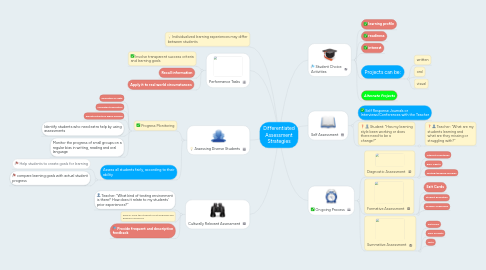Differentiated Assessment Strategies
by Jessica Lee


1. Individualized learning experiences may differ between students
2. Performance Tasks
2.1. Involve transparent success criteria and learning goals
2.2. Recall information
2.3. Apply it to real world circumstances
3. Assessing Diverse Students
3.1. Progress Monitoring
3.1.1. evaluation of data
3.1.2. consistent evaluation
3.1.3. adjust instruction when needed
3.1.4. Identify students who need extra help by using assessments
3.1.5. Monitor the progress of small groups on a regular bias in writing, reading and oral language
3.2. Assess all students fairly, according to their ability
3.2.1. Help students to create goals for learning
3.2.2. compare learning goals with actual student progress
4. Culturally Relevant Assessment
4.1. Teacher: "What kind of testing environment is there? How does it relate to my students’ prior experiences?"
4.2. Keep in mind the student's first language and English Proficiency
4.3. Provide frequent and descriptive feedback
5. Student Choice Activities
5.1. learning profile
5.2. readiness
5.3. interest
5.4. Projects can be:
5.4.1. written
5.4.2. oral
5.4.3. visual
5.5. Alternate Projects
6. Self Assessment
6.1. Self Response Journals or Interviews/Conferences with the Teacher
6.2. Student: "Has my learning style been working or does there need to be a change?"
6.2.1. Teacher: "What are my students learning and what are they missing or struggling with?"
7. On going Process
7.1. Diagnostic Assessment
7.1.1. Interest Inventories
7.1.2. KWL Charts
7.1.3. Writing/Reading Samples
7.2. Formative Assessment
7.2.1. Exit Cards
7.2.2. Student Reflection
7.2.3. Graphic Organizers
7.3. Summative Assessment
7.3.1. Portfolios
7.3.2. Final Projects
7.3.3. Tests

